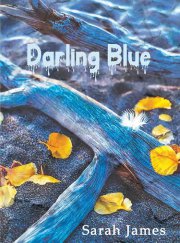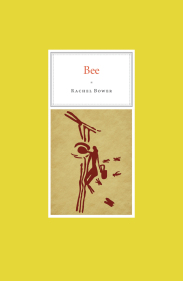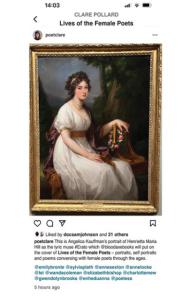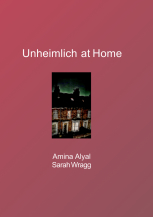
2014
SEPTEMBER CONTRIBUTORS
Magdalena Ball, Gram Joel Davies, Robert Ferns, Barbara Harroun, John De Herra,
Laura M. Kaminski, Elizabeth McMunn-Tetangco, Jared Pearce, Tony Press, Bruce Taylor, Lena Khalaf Tuffaha, Sarah White, Mariah H. Wilson, Thomas Zimmerman
MAGDALENA BALL
It’s an edgy boxcar, dreaming through falling leaves
fingers in the pocket of memory
bad sonnets scribbled in lipstick, test the limits of form
unrhymed promises unbroken: submerged.
Submerged here where my divided self
finally gives in to sleep, my body lost
and something else found, a piece of skin dug
from earthy matter, battered and cold, not fallen: lifted.
Lifted where nothing is the same at this hour, in this place
shadows longer than light, eyes tight
seeing through perception, the filmy corridors I slide along
ready for a new patina, an edge: this fresh pain.
In the morning my hands are bloody, echo of the ghost
who entered, played each curve: an opening big enough to charge into.
Somewhere Else
Banana trees sway, neglected against
pampered flora in the greenhouse
heavy fruit hanging, provocative
out of reach.
It’s a cold winter morning
here, on the other side of the world,
nostalgia moving uselessly through my veins
I can hear it pumping – thrum thrum
as I pour a second cup of coffee.
Wind lifts the eucalypts and I put down my cup
go outside, walk
walk and walk
the way my grandmother walked when she had
something to ponder
forever moving towards an elusive goal
it eludes me too
lost at home
finding home in my loss
on a normal winter day
at the end of summer
somewhere else.
Magdalena Ball is the author of the novels Black Cow and Sleep Before Evening, the poetry books Repulsion Thrust and Quark Soup, a nonfiction book The Art of Assessment, and, in collaboration with Carolyn Howard-Johnson, Sublime Planet, Deeper Into the Pond, Blooming Red, Cherished Pulse, She Wore Emerald Then, and Imagining the Future. She also runs a radio show, The Compulsive Reader Talks. Find out more about Magdalena at www.magdalenaball.com.
Back to POETRY ARCHIVE
GRAM JOEL DAVIES
Plans
When old and rich, my love, let’s spend
our last on cliffs, above the copper sea.
A whitewash house with windy slats and slates
that shake, its iron gutters rusted through.
Where you can plant us blue hydrangeas
that conduct the sky into the chalk,
and we might count away the teatimes
by the tussocks tumbling down to surf
as saltwind mouths away the lawn,
until our driftwood porch has gandered out,
a jawbone, jutting over circled gulls.
And this is when the night will plughole ‘round
the crosshatch glow, beneath the highest eave,
and lightning sound the flintcrest heave and ho;
while you and I, my love, at four a.m.,
thunder with the bedstead on the wall.
A bolt will plunge the flower bed,
the headland bitten like a scone,
and we’ll crescendo to the ocean floor --
ride the rocksled through a whooping storm.
Flume
She leaves him tasting of tarragon,
olive oil, black pepper.
He does not rinse his beard.
He wants to wear it
into the warm street like a lit flume.
People gull around his wake,
scenting his beard
comb the line of hers.
A man with rolled sleeves
sniffs and wants to plunge
his tongue,
but through a window a cab driver
draws breath, tasting
how he waited on
her nipple.
In the foyer, a clerk’s hand
floats over keys,
watching lift-numbers
kiss up her ribs, back down.
The lift fills with pepper
and tarragon. He parts the way,
his beard glowing her olive
glow, he licks spiced lips
and remembers: goes in.
Gram Joel Davies lives in Somerset, England. He is a member of Juncture 25 poets, and has written regularly for The Centrifugal Eye. His work has appeared in several other webzines besides. He believes poetry is about community, not pedestals, and likes to read aloud. He tweets @poplarist.
Back to POETRY ARCHIVE
JOHN DE HERRERA
Eventually
I liked it how
you said
God sits
on the tip
of my tongue,
and how God
has always been seen
as all the light
and all the dark,
joined;
and how what came
out of my mouth
could nurture or kill,
and the decision was
no one’s but mine.
And I liked it how you said
following my heart was a lot like
reading books you have to work
to understand:
how it’s tough at first,
but in sticking with it,
it gets easier to do;
and how eventually—eventually—
doing such sets your being
on a course to becoming a star,
a numinous orb
blazing away in the galaxy
of your choosing.
John De Herrera is a writer/artist who lives and works in Santa Barbara, California. He is author of the novel The Kingsnake in the Sun, and Hamlet/Macbeth: Translations. He is currently working on his second novel.
Back to POETRY ARCHIVE
ROBERT FERNS
The Two Shepherds
My Grandad spoke of the Golden Eagle,
High in its nest on the hill.
If you rose early enough, he’d say,
The world had such lovely things on show:
The first light of day, a lamb’s first breath in snow
And the Golden Eagle with its family on Beinn Ratha.
Up beside the Piggie’s House the marshals
Of the moor stalk their territory wary
Of the other: Grandad with his family
To feed, protected his flock as
Diligently as Abraham; and old Goldy
Twitching to every noise, golden eyes on
Top of the castle sourcing out prey
And thatching the bed for his Faberge eggs.
This isn’t to say that each little precious
Doesn’t stray out of turn: the shepherd’s crook
Was Grandad’s tool and your hook nudges and rolls
Our eggs to safety, like our painted faces
We roll down the hill in yearly celebration.
By the time the rest of the world has awoken
The derby day rivals have scaled their world
Over: circles over lambs throw shadow and cloud
Over Grandad’s grey bonnet, before a whistle
Draws the ranks by his two favourite soldiers.
Goldy raises his white tail, the surrender
Salute as he flies off into the sun.
A curt nod satisfies both parties to live
And fight another day.
In his latter days Grandad retreated to
Craggis Cottage: castle in Reay.
But every day he would cast his mind over
Beinn Ratha and with murmuring whistle
And a pair of Binoculars
He was carried back where his legs no longer roamed.
Grandad had his castle, Goldy his kingdom:
Happy to share in mutual respect
For the love each other protected at home.
When I lowered my Grandad into the Earth
The Eagle didn’t fly that day, instead
His ageing but handsome feathers
Swathed the colour of the coffin:
Honey gold and dignified brown, like to like.
And with your un-hatched eggs sprouted my words.
Robert Ferns studied in Edinburgh but now lives in the Highlands. His poetry has previously been published in Ancient Heart Magazine.
Back to POETRY ARCHIVE
BARBARA HARROUN
Summer is a Woman of a Certain Age
You relearn how to sleep in
sleep something you swim through
the way your children cut through
the chlorinated, many paned
window of the pool—shattered by the sun.
A mug of coffee palmed, the trees out back
are a sacred text you study as the wrens bathe
in the dry dirt of the garden. The tomatoes
wildly escape the confines of their wire,
the heirlooms so heavy they fell themselves
still the bright green that hums not ready, not ready
the plums in the front are the same, plunging
before they are ripe and you are certain
you are waiting and forgotten in the same way
that you’ve fallen asunder too soon
and refilling your cup of coffee with steady
hand, you shift the necklace of tear drop
prisms in the window, so the sunlight goes unfractured.
Plum Tree
The plum tree, a magician
juggling balls of sunset.
The plum tree, a young mother
spreading a shade colored blanket.
The birds gather. Two sparrows
screw as below an audience tears
bruised flesh from stone. What
remnants remain, the insects
scuttle a complicated choreography
to carry away.
I cry out, days later, when I step
on a clean, bleached pit, bare footed.
It draws blood.
Barbara Harroun is an Assistant Professor of English at Western Illinois University where she teaches creative writing and composition. Her work has previously appeared in the Sycamore Review, issues of Another Chicago Magazine, Buffalo Carp, Friends Journal, In Quire, issues of Bird's Thumb, Prairie Gold: An Anthology of the American Heartland, Requited Journal,Festival Writer, and Red Wolf Journal. It is forthcoming in i70 Review, Sugared Water,Per Contra, The Riveter Review, Catch and Release, Pea River Journal,Hermeneutic Chaos Literary Journal, Mud Season Review, and bioStory. She lives in Macomb,IL with her favorite creative endeavors, Annaleigh and Jack, and her awesome husband, Bill.
Back to POETRY ARCHIVE
LAURA M. KAMINSKI
Polishing
I was content, at eleven, to be the one selected
by Miss Schmidt to polish the class bell for fifth-form.
I took it out to the cool concrete of the porch.
It was our first year in the only two-story building
at our Nigerian boarding school, but in the fifth,
we still did not have any classes on the second floor --
Mademoiselle Tibbetts descended from her
mysterious domain above, taught us French,
lined us up against great unscreened windows,
recitation, translation, vocabulary while we
tried not to watch the crows.
The building’s one electric bell applied only to higher
forms, those exotics of the sixth and seventh
who emerged in chattering groups above us,
books and math-sets piled high as they migrated
classroom to classroom.
There was calm in the polishing, in seeing
the tarnish surrender. The deeply engraved “5”
gleamed in its wreath of leaves, ready to ring
Influence
after reading Kyle Coma-Thompson, Ruben Quesada, and Jose Angel Araguz
Ten. We played barefoot
on the sub-Saharan plateau,
made bows strung with fine
twine and tipped the arrows
with found bits of electric
wire stripped of insulation.
Before then, our arrows were
simple, blunt, not lethal,
just straight dried stalks
from guinea corn and millet,
but when they brought
the power in, we were quick
to modernize our weapons,
wax the twine with candle-
stubs. We began to follow
the white ducks, impatient
for them to preen
and leave a feather.
Laura M Kaminski is the Associate Editor of Right Hand Pointing, and a reader for The First Day. She grew up in northern Nigeria, went to school in New Orleans, and currently lives in Missouri. More information on her poetry is available at arkofidentity.wordpress.com
Back to POETRY ARCHIVE
ELIZABETH MCMUNN-TETANGCO
Supercells
After the rock came
through the window
I stopped watering
the lawn.
I leaned in
the doorframe,
until everything
had died
and my shoulders
were bruised gray
as supercells.
Wreath
My eyes are hot –
electric ranges
glowing red –
but I bought the bigger
sunglasses
on purpose.
My eyelids leak
like wounds
I should have covered.
The wind, a gut-punched howl,
tilts the wreath,
and it takes two men
to catch it.
Yellow House
My father stopped the car;
the street was full of ice. We looked
out at the yellow house.
Our breath against the windows
was like fire, eating the house.
It was the house my father lived in,
once, when he was young, dark now
as the inside of a lung.
The sky was pale as ash, and
exhaust behind the car trembled like ghosts.
We were the ghosts, worn thin and soft.
Sun against the ice glinted like eyes.
Elizabeth McMunn-Tetangco lives in California's Central Valley with her husband, son, and a big black dog. Her work has appeared or is forthcoming in The Turk's Head Review, Right Hand Pointing, Paper Nautilus, dislocate, decomP, and others.
Back to POETRY ARCHIVE
JARED PEARCE
Education
A man and his daughter in the yard, each holding
A flyrod (hers is pink). They cast out across the dead
Grass and reel-in bits of twigs and last year’s leaves,
Watching the line extend and retrieve, and loving
The chance discovery of what it brings. They do this
So she’ll be ready to go with him across living
Waters where one can’t know what will be
Dragged up when she extends herself into blind depths.
His rod (pricey) never dips or tugs at the lawn: his crisp
Movements make it easy when he can go a short way,
When he can find the length of his line. His mastery
Is an assurance not of adventure or security or success,
But that when confronted with the mystery,
If she’s careful, she’ll hook and draw power unto herself.
Jared Pearce teaches writing and literature at William Penn University. His poems are forthcoming from Interdisciplinary Humanities, Paper Nautilus, and The Write Place at the Write Time, and have recently been shared in Dead Flowers, Lines + Stars, Earth's Daughters, Fourteen Hills, and BYU Studies, where he won the 2014 poetry competition.
Back to POETRY ARCHIVE
TONY PRESS
November
No hiding permitted after Day of the Dead.
November light spares nothing.
Shadow and sun adhere to designated borders.
The air cracks.
Across the street
a stooped wife reaches deep into the trunk of a dusty Taurus,
hauling to the sidewalk a silver walker.
Now the husband,
gripping the chilled metal bars,
navigates the thirty steps to the clinic entrance,
his wife straining to brace the weighted glass doors.
Yesterday, in my classroom, exuberant Fatima,
fifteen, only four months removed from El Salvador,
play-swooned over my handsome son,
who smiled from a color photo on my wall.
“I see my future. He is my future.”
Turns out, they share birthdays,
though Andy’s had eleven more.
She has a point.
Gleefully again: “He is my future.”
From my kitchen, I see the husband disappear.
At my feet, my ancient pug, Elvin,
named for the drummer. His breath rattles.
Even Thanksgiving is gone.
Autumn’s clarity takes me by the hand, forces my attention
to the pseudo-Mexican-brick medical building that towers
against the blue Pacific sky, demands my lips echo hers:
He is my future.
Tony Press has been published about 50 times, online and in print. He generally writes fiction, believing that facts are valuable but stories invaluable, but he also dares the poetry gods from time to time. Loves include Oaxaca in Mexico, Bristol in England, and closer to home, San Francisco.
Back to POETRY ARCHIVE
The Poem In Progress
The way an almost autumn morning
comes to south facing houses
on the far side of the river,
slow along a low bank sculpted
by an August afternoon,
from a window where you always sit
a view from the second story,
the slightly bigger picture
of the smallness of your life.
Time passing not so much
as staying and settling,
the dead float of an old boat
adrift in the leaves, the crawl
of the shadow of a hoe aslant
the garage wall, a guilty thing
surprised by the slowness of its shame.
reminds us that life is short
and the world is filling up
with time. True, you may not
step in any stream twice but
every day I watch from my same
place this street at this same
time. True yesterday’s Chevy
with a broken tail light’s today’s
Ford with a headlight missing.
and maybe the barkeep sweeps or
is sweeping or has already swept
his side walk and then scattered
the seed for the sparrows in
the initials of someone he knows
who needs this simple prayer.
Of course, yesterday’s girl isn’t
getting any younger but do we old men
sigh less when she crosses our minds?
regrets everything,
is strangled by circumstance,
mourning and wishing
and wondering why.
I used to love yesterday’s
poem, all echo and hindsight,
trailing the little that was
left of not that long ago,
a record of the gone beyond,
all I thought said and done,
it seemed to be everything
there was to say, at the time.
For instance this cup
of half cold coffee half full
and the shadow of that birch
tossed upon another page
the waves of course
and if not that gull
another hovering
just hovering.
Bruce Taylor’s poetry has appeared in such places as Able Muse, The Chicago Review, The Cortland
Review, The Nation, The New York Quarterly, Rattle,
Rosebud, Poetry and Writer’s Almanac. His most recent collection is In Other Words, Upriver Press.
Back to POETRY ARCHIVE
LENA KHALAF TUFFAHA
Water & Salt
Palestinian detainees began a mass hunger strike in June 2014, subsisting on only water and salt.
Behind the walls of your jails we wait
heartbeats audible now
muffled thuds above the current of blood running thin
indigo rivulets pulsing loud beneath parchment skin
chaffing and coarse like stone walls that surround us.
we lie side to side,
we hunger for what eating cannot feed,
we carve out a sanctuary
that no beating can tear down,
no interrogation room scars can pierce
this is our ache we decide
how we live and if we die
we decide
who gives and who takes away
we claim the freedom to turn stone into sunlight streaming through your jails
freedom to sip water and salt like sacrament
freedom to own our bodies and the land beneath them
freedom to breath the air on both sides of the wall
freedom to wait and wait
for your checkpoints and your watch towers to be subsumed in a crashing wave
of water and salt
you never saw it coming, this cleansing,
how we have become this ocean.
Lena Khalaf Tuffaha writes poetry and literary translation. She has lived in and traveled across the Arab world, and many of her poems are inspired by the experience of crossing borders: cultural, geographic, political, borders between peace and war, the present and the living past. Her work has appeared in the journal Magnolia, Exit 13 magazine, Al-Ahram weekly, Vox Populi and the Seattle Times. Several of her poems are forthcoming in the online journal Human, based in Turkey, and in the print anthology Being Palestinian, to be published by Oxford Press in 2015. She lives with her family in Redmond, Washington, in the United States.
Back to POETRY ARCHIVE
MARIAH E. WILSON
Kummerspeck
Kummerspeck: (German) – Literally translating to “grief bacon,”
this delightful word refers to the less-than-delightful
excess weight you gain from emotional overeating.
During reruns of Friends
I ate my weight in M&M’s
so I wouldn’t sob
because you were Ross
and I was Rachel
and no one was ever sure
if they would end up together.
For awhile chocolate cake
held me together
though I was close
to bursting at the seams
and my jeans were cutting
off circulation to my legs,
or maybe my brain.
But I kept eating
because chewing kept my mouth
too busy to miss kissing you
and macaroni went down smoother
than my ache
and when I’m tired of chocolate
I wont feel this pain anymore.
Retired Jesus
Retired Jesus sits
all day long in his lawn chair
fresh out of miracles
but he’ll pass out
buckets full of prayer
don’t forget to toss a tip
into his hat
your generosity
could be the difference
between hunger
and happiness
or did you even notice
him sitting there?
Mariah E. Wilson is a writer from beautiful British Columbia. She has been published in Thin Air Magazine, Every Day Poets, The Kitchen Poet, Literary Orphans and The Corner Club Press, for which she is also now the Poetry Editor. Her first poetry collection, We Walk Alone, was published by Writers AMuse Me Publishing.
Back to POETRY ARCHIVE
THOMAS ZIMMERMAN
The Darker Sister
A woman sings to you. Believe it. Hear
the pick squeak on the strings, her bracelet scrape
the hollow body she embraces: shape
like hers, a darker sister, wordless seer
you too could wrap your arms around, no fear
because you’re drinking beer right now. Escape
with her, create a darker self to drape
along the curves you’ll learn to hold so dear.
So art beats death again. To resurrect
long-held desire in eight rhymed lines is well
beyond a parlor trick. The hardest part
is what you lose in syllables you’ve trekked:
the thing itself, no show but too much tell.
You stop. For now, your thought’s defeated art.
The Wheel
I walk with Percy, bag his turds, and puff
my breath at streetlights. Season’s changing. Let
it come. And soon I’ll see Orion, rough
with diamonds, come to hunt above the wet
and dripping pines out back. Then I’ll resume
my hunt: for God, who’s hidden . . . in the woods,
the fresh-laid cedar mulch, the twisting plume
that whistles from your kettle. Neighborhood’s
asleep, the stoops and porches dim as wells.
I’m home. I think we’ve played it right, this life.
The panorama is comedic, but
the close-ups can be tragic, pocked with hells.
Accept it: basement mermaids, attic wife.
The wheel still turning, loosening its nut.
Thomas Zimmerman teaches English, directs the Writing Center, and edits two literary magazines at Washtenaw Community College, in Ann Arbor, Michigan. His chapbook In Stereo: Thirteen Sonnets and Some Fire Music appeared from The Camel Saloon Books on Blog in 2012. Tom's website: http://thomaszimmerman.wordpress.com/
Back to POETRY ARCHIVE



